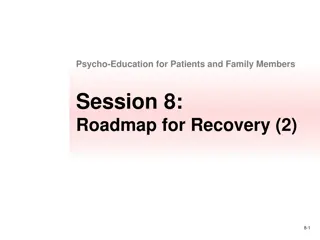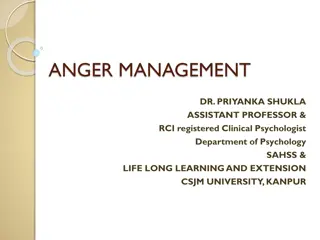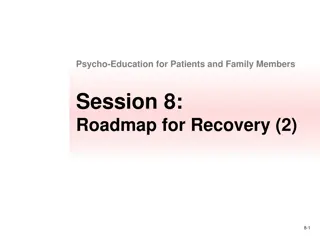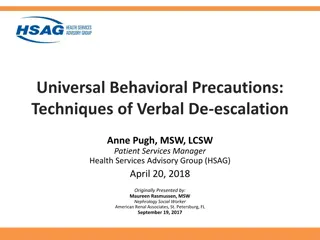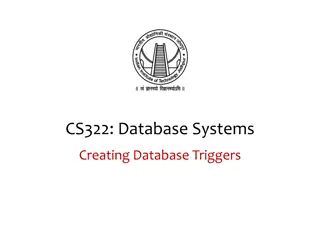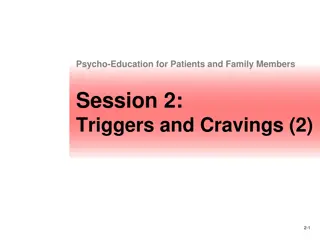and Managing Anger Triggers
Anger comes in various strengths, from mild irritation to fury and rage. Learning to use anger creatively and effectively is crucial for healing relationships. Anger is a natural emotion but it's important not to let it lead to unacceptable behavior. Three common triggers for anger include experiencing unfair situations, feeling unable to address wrongs, and encountering intolerable experiences. Anger often masks deeper feelings like fear, shame, and rejection.
Uploaded on Mar 10, 2025 | 0 Views
Download Presentation

Please find below an Image/Link to download the presentation.
The content on the website is provided AS IS for your information and personal use only. It may not be sold, licensed, or shared on other websites without obtaining consent from the author.If you encounter any issues during the download, it is possible that the publisher has removed the file from their server.
You are allowed to download the files provided on this website for personal or commercial use, subject to the condition that they are used lawfully. All files are the property of their respective owners.
The content on the website is provided AS IS for your information and personal use only. It may not be sold, licensed, or shared on other websites without obtaining consent from the author.
E N D
Presentation Transcript
Week 7s topic Anger
Anger comes in a range of strengths, from mild irritation, to frustration, all the way to fury and rage We all get angry
When we get angry, we need to learn how to use our anger creatively and effectively not to hurt people but to heal yourself and your relationships with others
What we usually call anger is actually only the 1st stage the protective stage. Here, your anger gives you a power boost to make you feel bigger and stronger so that you can face a person who seems more powerful than you or a situation that seems too difficult to manage.
1st Stage anger is a built-in, natural emotion that everyone feels. It kicks in automatically
The fact that anger is a normal, God-given response in NO way means it is okay to do unacceptable behaviour Ephesians 4 v26-27 In your anger do not sin. Do not let the sun go down while you are still angry, and do not give the devil a foothold. It is normal to be angry, but it s what you then do with your anger that matters
3 things trigger your anger: 1. You experience a situation or behaviour that you judge is unfair, hurtful, or in some other way wrong 2. You feel unable to calmly and easily right the wrong this may be because you believe that you lack the skill or ability to do so, or the person/situation seems bigger than you can handle 3. The experience is troubling enough that you cannot simply tolerate it or let it go.
Think of a situation recently when you got angry. Which one (or more) of the 3 triggers explains best why you got angry?
abandoned ignored afraid overwhelmed ashamed Controlled, criticised Belittled, blamed Unfairly treated unappreciated Inadequate, rejected Anger often covers these deeper feelings
If you hold onto anger for a long time, it causes you problems Physical ulcers, diarrhea, frequent colds and flus, slower wound healing, heart attacks, headaches, backaches, high blood pressure Mental, emotional and spiritual it separates you from other people, keep feeling like a victim, impacts your ability to be grateful and have a healthy spirit, feeling inadequate, depression and anxiety
Proverbs 14 v17 A quick-tempered person does foolish things, and the one who devises evil schemes is hated. Proverbs 29 v22 An angry person stirs up conflict, and a hot-tempered person commits many sins. Proverbs 30 v33 For as churning cream produces butter, and as twisting the nose produces blood, so stirring up anger produces strife.
We are not created to be angry all the time!
James 1 v19 and 20 says, Everyone should be quick to listen, slow to speak and slow to become angry, for man s anger does not bring about the righteous life that God desires.
The 1st stage of anger is automatic. It just happens! The 2nd stage is optional. To reap the benefits out of anger, you need to consciously choose stage Two. The 2nd stage of anger is quieter, more thoughtful than stage one.
Step 1: Safely regain your emotional balance - Identify your anger cues - Regain your emotional balance instead of harming others - breathe diaphragmatically. This relaxes your contracted muscle - take an exercise break. Use up the adrenaline-fueled energy - talk about it find someone you trust and talk about it. Talking it through reduces the tension - write a poison-letter write out your anger. This releases a lot of the frustration. Once it s written and the anger is released, destroy the letter
What is your way of calming down when angry? How often do you do it when angry? All the time, some of the time or never?
Step 2: Write it down in more detail Describe the anger-provoking experience and your thoughts and feelings about it by writing it down. - writing it slows the mind down. It also stops you going over the same info all the time.
Step 3: Identify your Unmet Need You experience painful feelings and anger because there is a need that is unmet. To help identify your unmet need, re-read your Letter from Step 2. Look at the painful feelings you experienced if you feel ignored, then your unmet need to be seen or included or recognised
Step 4: Take Action to meet your Need Decide how you will fill your need, and take small, manageable steps to do so. For example, if your unmet need was that you weren t listened to by a teacher, what could you do to meet that need?
Step 6: Forgive - Forgiveness is not about condoning someone else s actions - Forgiveness is the only way for you to be free of anger - forgiveness opens up the possibility of reconciliation with the other person. - Write or tell the other person that they are forgiven
Matthew 5 v23-24 Therefore, if you are offering your gift at the altar and there remember that your brother or sister has something against you, leave your gift there in front of the altar. First go and be reconciled to them; then come and offer your gift.
How to tell if you are dealing with anger well: - Do you end up hating the person, holding grudges? Do you end up harming the other person with your words or actions? OR Do you forgive them?






